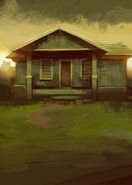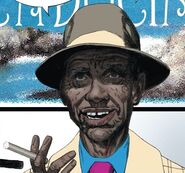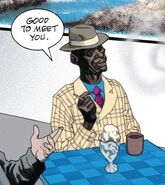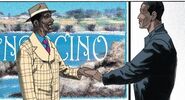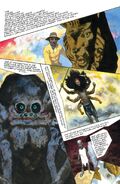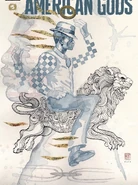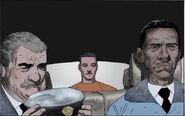| “ | He was looking at Mr. Nancy, an old black man with a pencil moustache, in his check sports jacket and his lemon-yellow gloves, riding a carousel lion as it rose and lowered, high in the air; and, at the same time, in the same place, he saw a jeweled spider as high as a horse, its eyes an emerald nebula, strutting, staring down at him; and simultaneously he was looking at an extraordinarily tall man with teak-colored skin and three sets of arms, wearing a flowing ostrich-feather headdress, his face painted with red stripes, riding an irritated golden lion, two of his six hands holding on tightly to the beast's mane; and he was also seeing a young black boy, dressed in rags, his left foot all swollen and crawling with black flies; and last of all, and behind all these things, Shadow was looking at a tiny brown spider, hiding under a withered ochre leaf. | ” |
Mr. Nancy is Anansi, one of the Old Gods, and a central character in American Gods. He is also the titular character of the novel Anansi Boys.
Background[ ]
Mr. Nancy is one of the first gods Shadow meets after Mr. Wednesday and Czernobog. Shadow meets him in the cafeteria at the House on the Rock. He is a cynical, snarky, wily trickster god who lives in Florida. He often makes fun of Shadow, despite being helpful to him and being mostly loyal to Mr. Wednesday's cause. Nancy has extensive interchange with the more intense Czernobog. The two of them later travel with Shadow to the Center of America and the World Tree. After the main events of the story, Mr. Nancy helps Shadow by taking him to Florida, where he replenishes his strength by singing karaoke.
Mr. Nancy mentions at one point that he gains worship by having stories told about him. He tells stories based on West African animism, including such characters as Bird, Tiger, and Monkey. Tiger first owned all the stories; sad stories about the hunt, blood, and death. After some time, however, Anansi stole all of Tiger's stories and was the focal point in funny stories about trickery and being clever. In these stories, Mr. Nancy plays tricks on the other animals, as he is a trickster god.
Significance in narrative[ ]
Chapter Five[ ]
At the House on the Rock, Shadow, Mr. Wednesday, and Czernobog encounter Mr. Nancy at the pizzaria-cafeteria. Wednesday leaves for the restroom while Shadow is introduced to Mr. Nancy. Once Wednesday returns, they set off again through the House on the Rock, finally reaching the Carousel Room.
The carousel goes round and round without stopping because it is meant to be admired, not ridden. Wednesday then asks Shadow to help them onto the platform where he, Czernobog, and Mr. Nancy jump on board the carousel. Shadow joins them, feeling more uneasy breaking the rules at the carousel than he did robbing the bank that morning.
Once on the carousel, each of the men select a mount with Wednesday picking a golden wolf, Czernobog choosing an armored centaur, and Nancy climbing on a roaring lion. Shadow eventually selects a tiger with an eagle's head to ride. The four men laugh and enjoy their ride on the carousel as the Blue Danube waltz plays and the lights glistened. Then, the lights go out and Shadow sees the gods.
Chapter Six[ ]
When the lights go out on the carousel at the House on the Rock, the only illumination is from starlight as the eagle-headed tiger beneath Shadow seemed to come to life. He is able to see multiple dimensions with Mr. Nancy appearing to him in all his various forms. The creatures they rode trotted them to a wooden hall on a hill. Czernobog tells Shadow that none of it is really happening and it's all in his head. Shadow also sees Czernobog in his various forms as Wednesday steers his giant wolf over to Shadow's side and tells him his various names, leading Shadow to ask if Wednesday is Odin, which Wednesday confirms.
They enter Valaskjálf, Odin's old hall, as Mr. Nancy explains to Shadow they're in Wednesday's mind. Wednesday is upset that there aren't as many people waiting for them in the hall as he expected. Mr. Nancy steps up as the "warm-up" man and tells the crowd of Old Gods a story about how he stole Tiger's balls and blamed it on Old Monkey, which is why to this day, Tiger chases monkeys. Wednesday next stands before the people gathered. He gives them a speech about how the New Gods are growing in America and it is now time for the Old Gods to act. Mama-ji gets into an argument with Wednesday, saying they only have to wait for the New Gods to die out like the ones of the past. Wednesday tells them all they have already lost everything and he is offering them the chance to take something back.
The fire burns out and the meeting ends. Shadow asks Mr. Nancy what happens next and Nancy says Wednesday buys them all dinner and will work them one-by-one over to his side. They are suddenly back in the Carousel Room and Wednesday is talking to what looks to be a group of tourists. Wednesday leads them out of the House on the Rock as Shadow asks Nancy if it really happened. Nancy replies, "Heck, nobody's allowed to ride the carousel. Didn't you see the signs? Now hush."
Chapter Thirteen[ ]
After Shadow is arrested in Lakeside by Chief Mulligan, Shadow calls Ibis and Jacquel Funeral Parlor. Mr. Ibis answers and Shadow asks him to track down Wednesday. Ibis tells Shadow he can't get a hold of Wednesday but he left a message with Mr. Nancy and wishes him luck.
When the Lafayette deputies arrive at the jail to pick Shadow up, Mulligan signs Shadow over to them. Shadow is put into the backseat of a black town car. As they drive away, the deputies reveal themselves to be Mr. Nancy and Czernobog.
Chapter Fourteen[ ]
Czernobog and Mr. Nancy take Shadow to Minneapolis where they meet up with Alviss and change from the black town car to a VW bus. Alviss expresses his sympathy to Shadow and asks if the "vigil" falls on him, which Czernobog says he will not have to do.
Eventually they stop for food and gas. Mr. Nancy receives a phone call from the New Gods telling them to meet in the Center of America, neutral territory for both the Old Gods and New Gods, so they can give them back Mr. Wednesday's body.
They drive toward Lebanon, KS and the Center of America, stopping in Humansville, MO and visiting a supermarket where they encounter Gwyndion who promises Mr. Nancy he'll "be there." They continue driving before another brief stop outside Cherryvale, KS. Czernobog exits the vehicle and walks to the center of a meadow where he had once been worshiped and he feasts on its residual power, rejuvenating himself.
They reach the Center of America that evening and park at the one-story motel. There is a chauffeur and a female newscaster standing outside. Media introduces herself and leads them inside where Technical Boy is waiting with Mr. Town. Shadow asks Mr. Town if he's slept with Mr. Wood's wife yet. Mr. Town hands room keys to Mr. Nancy who passes them out to Shadow and Czernobog. Shadow heads to his room and falls asleep.
Media calls Shadow for dinner and he walks out to find the chauffeur has brought everyone McDonald's from Nebraska. As they eat dinner, Shadow asks when they can take Mr. Wednesday's body and is told that according to the rules, they have to wait until midnight. After dinner, Shadow heads outside with Mr. Nancy. Nancy warns him that with Wednesday's death, the war between the Old Gods and New Gods has started. Mr. Nancy returns inside.
It's soon close to midnight so everyone heads to Room Five, where Wednesday's body is laid out in the middle. Loki calls the gathering to order and asks if anyone would like to say something. Mr. Town passes, Czernobog warns that this is the start of war, and Technical Boy starts to recite a poem but can't remember the rest of it. Shadow says that the whole situation is "pitiful" because half the people there had a hand in killing him but Shadow is still working for Wednesday. Media makes a few pithy comments about life and death before Mr. Nancy finishes off with another warning that the New Gods would pay for what they had done.
The New Gods leave. They wrap Wednesday up in sheets and Shadow carries him out to their bus. Mr. Nancy takes the wheel and they leave the Center of America, heading east. When they reach Princeton, MO, Nancy asks Shadow where they can drop him off. Against their protests, Shadow insists that he is staying with Wednesday's body and will hold the vigil even after Czernobog and Mr. Nancy both warn him it will kill him. Even though Shadow hopes he will survive, he is willing to die because then maybe he'll finally have lived.
They drive Wednesday's body to the ASH farm in Virginia. A perfectly symmetrical silver-gray tree rises up higher than the farmhouse, identical to Wednesday's silver tie pin. There are three women of descending heights by the tree who Shadow mistakes at first for the Zorya Sisters. The tallest sister removes Wednesday's body from the bus and the three sisters place his body underneath the tree before approaching Shadow. They ask if he's the one who will mourn and hold vigil for the all-father and Shadow nods. Nancy tries again to dissuade him but Shadow holds firm. Czernobog says that Shadow needs to survive the vigil for him because he still gets to hit him on the head.
Chapter Eighteen[ ]
At Rock City, Czernobog, Anansi, Kali, and many others gather for their war.
After Shadow stops the war, Mr. Nancy tells Shadow he is proud and they exit from Backstage. There are several gods injured from the initial skirmish and helicopters come to clean up the mess left behind.
Chapter Nineteen[ ]
Shadow and Mr. Nancy drive to Mr. Nancy's home in Florida. Mr. Nancy takes Shadow out to a bar and they sing karaoke together. Shadow dreams of the Buffalo Man that night and awakens the next morning with a hangover and Mr. Nancy making breakfast. Mr. Nancy goes to a trunk to retrieve some aspirin, jogging Shadow's memory about something to do with trunks. He quickly leaves Mr. Nancy's because "the ice is melting."
Anansi Boys[ ]
Anansi Boys is centered on the children of Mr. Nancy, who dies at the beginning of the story. Mr. Nancy's son, Fat Charlie, moved from Florida to London to escape his humiliating father and when his father dies, he learns of his long-estranged brother, named Spider.
Physical appearance[ ]
Mr. Nancy is described as a small, elderly black man with "a hint of patois that might have been West Indian" in his voice and his eyes are described as the "color of mahogany." He has a pencil mustache and wears a lime-green fedora and lemon-yellow gloves with a checkered suit.
Gallery[ ]
Black Phoenix Alchemy Lab
Graphic novel
Cultural background[ ]
Mr. Nancy is the American Gods version of Anansi, a popular folktale character and cultural hero. He is from Ghana, originating from the tales of the Akan people. He quickly got a good place in the Ashanti mythology and his legends spread across all of West Africa, and then into the Caribbean folklore.
Sometimes called Kwaku Anansi, Kompa Nanzi or Nancy, Anansi is described as both a spider (Anansi meaning “spider” in the Akan language) and a humanoid being – his depictions ranging from fully human-looking or completely spider-like to hybrids such as a spider with human face and clothes or a man with eight limbs. He is often described as having a family: he has a wife, that bears different names according to the sources, and several sons (Ntikuma, his first-born son, Tikelenkelen, his big-headed son, Nankonhwea, his son with spindly necks and legs, and Afudohwedohwe, his big bellied son). Some story also tells of Anansewa, the beautiful daughter of Anansi that he tries to wed to the most profitable parties.
Anansi is a famous trickster, renowned for his ruses, his cunning, his talent at making speeches and his skills as an orator. The Akan consider him an Abosom (equivalent to the Yoruba orishas and Vodun loas). The Abosoms are in the Akan spirituality powerful spirits, akin to lesser gods, that helped shape the world and are a link between the mortal, earthly beings and the supreme entity that is Nyame, the Sky Father. Anansi is said to be either the son of Nyame and Asase Ya, the Earth Mother, or merely their servant and messengers. However, Anansi never received any intense worship and his divine nature was never put forward by the Akan, who felt that his role as a cultural figure and folklore hero was much more useful than his religious aspect.
Among the many legends about Anansi, two stick out the most because they each explain one of Anansi’s role in the world.
The first story explains that in the beginning the world was story-less, for all of them were kept in a box by Nyame, the Sky Father. Anansi thought the world was boring and thus went up at the top of the universe to meet with Nyame and ask from him the box of stories. Nyame, impressed that Anansi managed to reach him with his silk strings, agreed to give him the stories in exchange for the capture of extremely dangerous creatures, such as the Python, the Leopard and the Hornets. Anansi managed to capture all these deadly beings through ruses and tricks, and Nyame gave him the box. That is why today Anansi is considered the master of all stories in the world and the patron of storytellers.
The second story says that a long time ago, the clever Anansi craved for more intelligence,and set out on a quest to collect all of the knowledge in the world. Then he put all of this wisdom into a jar (or a calabash) and decided to keep it all for himself. Searching a safe place to hide his treasure, he chose to put it on top of a high tree. He tried several times to climb the tree while holding the jar, or tying it to his belly, to no use. Anansi hadn’t noticed that his son, Ntikuma, had secretly followed him, curious about what his father may be doing. When Ntikuma suddenly shouted at Anansi that to carry the pot all up to the tree, he had to carry it on his back, Anansi got a shock due to the surprise.
Here the story splits in two popular versions. In the first one, Anansi, surprised, let the jar out of his hand, and it crashed on the ground. Immediately, a storm came and its rain washed all of the world’s wisdom away in the river. Anansi, angry at his son, chased him under the rain until he realized that having all the world’s wisdom was not useful if you still needed the help of a child to do things right, and forgave Ntikuma. The other version rather has Anansi following his son’s advice, and climbing on the top of the tree with the jar, only to conclude the same thing as in the other version. He then threw the jar himself onto the ground, so that the wisdom would be free to spread in the world. This story explains why Anansi isn’t merely considered as a clever and cunning trickster, but also as a “wise” figure and the one who offered knowledge and wisdom to the world. (Some like to claim that the box of stories of Nyame and the jar of wisdom of Anansi are one and the same [1]).
But these are just two of Anansi’s many stories. Another one tells of how he created the first inanimate human body, another speaks of him as the one who brings rain in the mortal world and causes the floods. He is also considered the one who taught human how to plow and sow. A legend says he created the sun, the moon and the stars and thus was responsible for days and nights[2], and another explains that he helped Owia the Sun, youngest son of Nyame, to gain his father’s role as the chief of the world, against his two older brothers Esum the Night and Osrane the Moon, and that for his services Anansi became Nyame’s personal messenger. A last tale explains that when all of the animals in the world fought over who was the oldest, Anansi won the argument because he explained that, when his father died, he had to bury him in his own head, for the earth didn’t exist back then.
Fittingly for Anansi, master of storytelling, his survival and the spread of his popularity across the globe was due to him being part of an oral culture – unwritten traditions and stories that spread from mouth to ear in all of the western African continent before going over to the Caribbean Islands, and then the New World. Indeed, when slaves were brought over from the Caribbean and the African continent to the Americas, they told each other the stories of Anansi – the “anansesem” or “spider tales” in the Ashanti language, a specific genre of tales for children centered around the Spider adventures. Since most of these stories told of a little, weak spider turning the table on powerful oppressors through his cunning and his tricks, Anansi quickly became a symbol of resistance and survival during the slavery era – and telling his tales was a way for the slaves to keep their original identity and culture alive.
However, this transition from the Old World to the New World modified Anansi’s characterization. While in America he became a classical hero to admire, imitate and follow, originally Anansi wasn’t a paragon of moral virtues. He was a flawed character and while his stories often showed him as, indeed, the winner or the survivor of a world turned against him, sometimes Anansi brought unfortunate events upon himself or the world due to his own vices – the “anansesem” were entertaining and instructive, yes, but also a warning against how avarice and selfishness could be our own undoing.
For example, a story explains how Anansi, supposed to find Nyame a wife among a village of beautiful maidens, decided to take all of them as his own wives without any of them for Nyame, and when the Sky Father “stole back” all of Anansi’s wives for his personal harem, the Spider unleashed all of the sicknesses existing upon the world as a way to get his revenge. Another explains that Anansi one day received meat from Death itself to feed his family. However, upon seeing that Death had endless supplies of meat (for everything living in this world belongs to Death), Anansi became greedy and stole from Death. Death, angry, followed Anansi back to punish him and while the Spider evaded it, he still brought mortality into the world of the living. A last story explains how Anansi announced to all the animals that Gun, the personification of firearms, their deadly archenemy, was dead and invited them to his funeral. What the animals didn’t know was that in fact, Gun wasn’t dead, and Anansi had borrowed him from the Hunter – thus, once all the animals were reunited, Anansi killed them all and then took their bodies to his home so that he may feast on them.
Anansi was included into the Haitan Vodou as a Gede Lwa. The Lwa or Loa, falsely called “gods” of vodou, are powerful spirits forming an in-between stage between the mortal creatures and the supreme being, while the Gede were a specific family of Loa associated with death, the afterlife and funerals. As a Loa Gede, Anansi was supposed to establish or facilitate the link between the living and their deceased ancestors. [3]
Notes and trivia[ ]
- Mr. Nancy originated from Anansi Boys, which started out as an idea Neil Gaiman came up with prior to writing American Gods. [4]
- Black Phoenix Alchemy Lab produced a perfume oil based on Anansi, for their "American Gods II" line of products. It is named "The Jeweled Spider" and described as : Cigarillo smoke, spatters of ice cream sundae, a supersized mug of coffee, a pile of fruit, and a little bit of curried goat. They also created a home-and-linen spray based on Mr. Nancy's house, described as: The ghosts of long-dead cookies, whirring palmetto bugs, cigarillo smoke, and crawling things that scuttle and click.
References[ ]
- ↑ https://mythology.net/mythical-creatures/anansi/
- ↑ Dictionary of rain, by Patrick Boman
- ↑ https://en.wikipedia.org/wiki/Anansi
- ↑ http://journal.neilgaiman.com/2005/05/anansi-boys-question-of-day.asp


